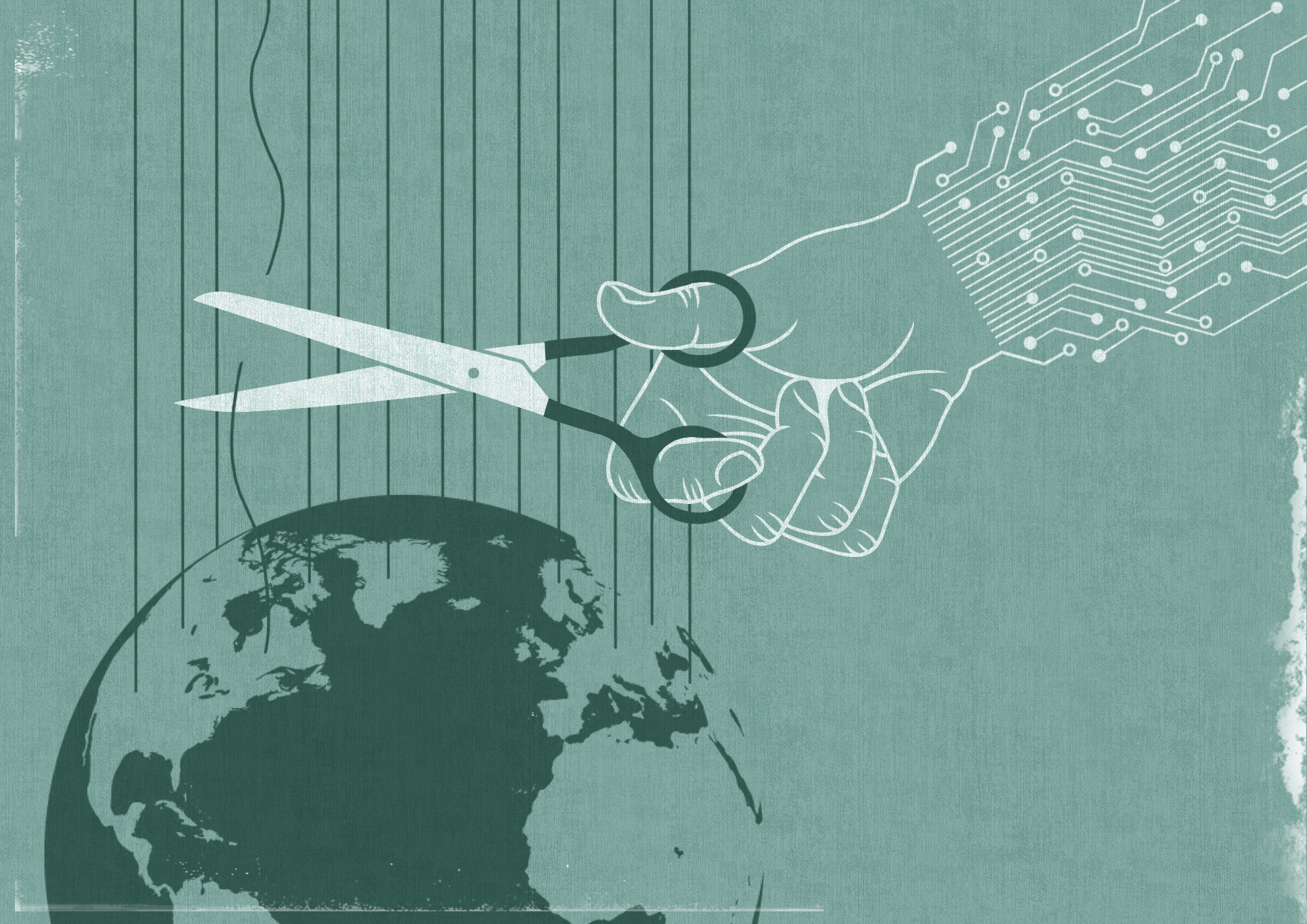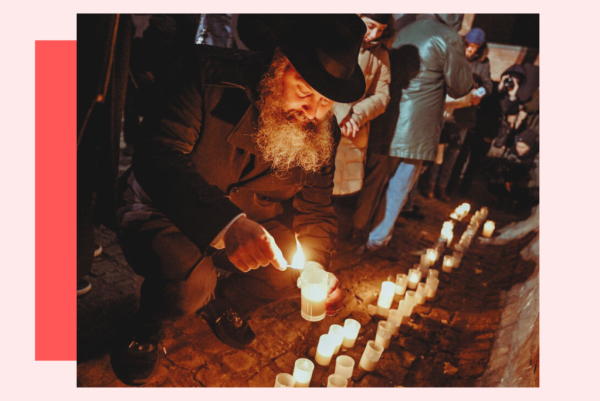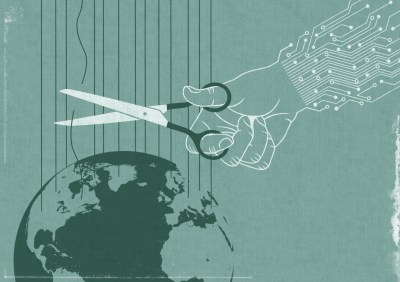In some instances—such as when deadly hurricanes plow through homes—our inability to control our environment is obvious. At other, often mundane times, though, not only is it less obvious, but the assumption that total control is good takes hold.
Writer and editor Samuel D. James argues today, though, that while using technology to control so many facets of our daily lives brings unparalleled convenience, it can create great illusions that ultimately cleave us from a key element of our humanity: depending on others and, ultimately, on God.
Samuel D. James: To Renew Culture, Give Up Control

I miss the radio. No, really. I do.
Growing up in a conservative Christian home that for many years prohibited “secular” music, I developed a real bond with my dad’s portable boombox. Some mornings I would wake before the rest of my family, tiptoe to the basement, and tune it to a local Hot 100 station (I’ve lived a very edgy, rebellious life). The music was largely both harmless and mediocre. But to an angsty homeschooled adolescent, it was a kind of emotional watershed. Though owning CDs was not possible for me then, I learned how to call a station’s request line, and wait for the moment of almost incandescent delight when I heard one of my beloved songs begin.
Twenty-plus years later, I’m utterly free to listen to just about anything I want, whenever I want. I don’t need an 800 number, a radio, or even to get out of bed. The rectangular piece of glass in my pocket gives me almost infinite access to any tune from those early mornings, and millions more.
To be honest, I don’t care very much. But this is instructive beyond just one writer’s musical malaise.
So it goes that the delights of yesteryear only rarely satisfy these days. I’m glad my adolescent angst has receded, but I didn’t expect that my relationship with music would, too.
Music streaming apps—which have taken the place of the call-in radio shows of my youth—are a perfect example of how technology can now offer us almost total control over what we encounter. We can pick our songs, put our customized playlists on repeat, and skip anything we don’t want to listen to. We do not encounter music with surprise or serendipity. Some even opine that the traditional album, with its progressive track-by-track anticipation, is a dying artifact. Instead of unleashing our delight in music, the controllability of the streaming app mostly inspires us to make it background noise.
Yet with so much technological control, Americans and others in the West report higher levels of anxiety, depression, and despair than at any other recorded time in modern history. The modern therapeutic crisis comes as Western people possess an enormous amount of personal power over their daily lives, at least relative to previous generations. Yet the very aspects of life that have become more controllable are the ones that seem to be closest to the source of our angst.
Consider marriage and relationships. Dating apps have succeeded in giving singles much more control over their experiences; they can see pictures, read profiles, get “matched,” and swipe left or right without the frustration or risk of actually having to meet the person. On paper, this kind of matchmaking mastery should lead to fulfillment en masse. But it has not. In fact, marriage and fertility rates are in historic decline across many developed nations. Singles today are less likely than ever to be going on dates or even looking for a relationship. Loneliness, unfulfilled desires, and simmering resentment and polarization between the sexes are on the rise.
Consider politics as well. It’s common to observe that the digital age has “democratized” information. The current media landscape is no longer concentrated among an exclusive journalist class and a few elite publishers. Instead, social media, newsletters, podcasts, YouTube, and more have given consumers the ability to curate their information sources to their exact ideological preferences. And yet, many people report lower trust in the information they get. Getting to pick what we see and hear to such an extent has not calmed our anxieties. If anything, we are angrier and more pessimistic than we were 30 years ago.
So we find a cultural contradiction at work. In a modern, technological society, we associate higher levels of control with greater happiness and fulfillment. Yet this association does not appear to bear out in real life. Almost every dimension of life is more customizable, more responsive to our desires and input than it was a generation ago, but many are left unsatisfied.
But what if this is not so much a paradox as a symptom? In his book The Uncontrollability of the World, German philosopher Hartmut Rosa uses the word “resonance” to describe those moments of self-forgetful joy and meaning that we often associate with our most stirring memories. Rosa makes a provocative argument: We cannot experience true resonance in situations where we feel a high degree of control. The more power we wield in a given moment, the less resonance we experience.
“Because we, as late modern human beings, aim to make the world controllable at every level—individual, cultural, institutional, and structural—we invariably encounter the world … as a series of objects that we have to know, attain, conquer, master, or exploit,” he writes. Then he goes on:
And precisely because of this, “life,” the experience of feeling alive and of truly encountering the world—that which makes resonance possible—always seems to elude us. This in turns leads to anxiety, frustration, and even despair, which then manifest themselves, among other things, in acts of impotent political aggression.
Rosa draws from several fields to support his argument, including human relationships. Relationships are meaningful only to the degree that they do not merely mirror our own selves. We cannot dictate what “the other” thinks (or else that person is no longer an “other”). We cannot calibrate their personalities or temperament to our preferences, and they cannot do this to us, either. Relationships of resonance, Rosa observes, are relationships in which members are confronted by their own lack of control but experience love and joy anyway. Total control is mere slavery or abuse. Zero control is chaos. Resonance requires individuals who give and receive love freely.
Rosa is primarily interested in the economic and political structures that prop up an ethic of controllability. But this is really a spiritual problem as much as it is anything else. Controllability is desirable for two reasons. First, modern people tend to see the world as (to use Rosa’s term) a “point of aggression,” i.e., something that intrinsically threatens them and must be tamed. When we lack control, we face risk: risk of hurt, disappointment, even death. A person whose instincts are primarily turned toward eliminating these risks must try to control more and more of the world. Second, controllability exalts human effort first and foremost. It centers the self. Both of these factors are connected to the secular outlooks and habits of our post-Christian society.
In the secular narrative, the world keeps its wildness but loses its beauty and transcendence. Materialist philosophies can observe these things and acknowledge they exist, but they cannot explain why they exist outside of our brains. As the English philosopher Roger Scruton has pointed out, “scientism”—the belief that scientifically provable and explainable phenomena are the only “real” things in the universe—cannot explain beauty. If our human responses to magnificent landscapes, great art, and passionate love can be explained solely by chemical reactions in the brain, the meaning of those places and paintings and relationships is trivial. They are no different than a jolt of electricity delivered directly to our temporal lobe. They symbolize no greater realities, and their existence is totally accidental.
No person can long stand in awe of something with so little real meaning. Instead, most will simply try to control them, to wring out of these things whatever convenience they can.
Living contrary to the secular worldview, by contrast, displaces the individual self from the center of the universe. If there are higher realities than me, then I must humbly accept my limits, including the limits of my control. Christians, for example, believe that God is completely in control of our lives, and that even suffering ultimately serves a purpose. This conviction means that the point of life cannot be merely to run from suffering or minimize risk. Even the things that cause us suffering can be reconciled as part of a divine plan to bless us.
Love itself is often a cause of suffering, precisely because it lies outside our control. To seek total control is to rule out love. As C.S. Lewis famously observed in The Four Loves:
Love anything and your heart will be wrung and possibly broken. If you want to make sure of keeping it intact you must give it to no one, not even an animal. Wrap it carefully round with hobbies and little luxuries; avoid all entanglements. Lock it up safe in the casket or coffin of your selfishness. But in that casket, safe, dark, motionless, airless, it will change. It will not be broken; it will become unbreakable, impenetrable, irredeemable. To love is to be vulnerable.
Thinking this way could transform political discourse. Biblical wisdom, so deeply tethered to the realities of human nature, reminds us that finding truth involves challenging appealing narratives (Proverbs 18:17). Instead of using technology to piece together a news and opinion intake that never challenges us, we could discerningly expose ourselves to opposing viewpoints—not for the sake of bland “balance,” but, at the very least, to learn how other people think and be able to communicate more fairly across divides.
It could also reverse cultural trends. Accepting the goodness of uncontrollability subverts the logic at the heart of the emerging generation’s loneliness/risk-aversion gridlock. Friendship involves risk; people can disappoint you or even disappear. Asking someone on a date involves risk; you might be embarrassed by their answer. Having children involves risk; kids complicate your life, demand your attention, and can get angry, sick, or simply mysterious. But these risks are part of a well-lived life. Technology has a place, but using it as a “safe” retreat from the hazards of in-person relationships is, as we’ve seen, a path to misery.
Our relationship to technology will reveal to what degree the ethic of controllability is dominating us. There are movements afoot that are rethinking the role of digital technology in the lives of kids and teens, exemplified by the work of thinkers like Jonathan Haidt and Jean Twenge. Is our response to every crisis to endlessly Google, hoping for some tool or hack to immediately relieve the pain? Can we make peace with quiet and boredom, or does a moment of unexpected stillness demand a check of the inbox or a refresh of the app?
The ethic of controllability is fundamentally a mirage. Our world is not infinitely responsive to our wishes. Rather, as Christianity teaches us, we only find happiness when we submit to realities above and beyond us, humble ourselves, and cultivate gratitude for the good things God has given. Humility and wonder can help us find a way off the carousel of disillusionment and frustration. And we may just find the music a little brighter, too.
More Sunday Reads
- Earlier this month, the Synod of Synodality began at the Vatican, a time for bishops and Catholic leaders to discuss structural changes in the Catholic Church. This helpful explainer from Religion News Service’s Claire Giangravé breaks it down. “A three-year consultation centered on dialogue and listening at all levels of the church, the Synod on Synodality was called by Pope Francis to promote ‘a new way of being church.’ But in March, the pope said that some of the controversial issues that emerged during the debates — including women’s ordination, priestly celibacy and the inclusion of LGBTQI+ individuals — were off the table until 2025. This left many faithful and Vatican observers wondering what was the focus of the Oct. 3-27 Synod on Synodality. Instead of introducing sweeping reform to Catholic doctrine and magisterium, the ongoing synod emerged as a think tank for microchanges in church structure. Those changes could usher in profound structural transformation in the institution by allowing more laypeople to be involved in running the church.”
A Different Kind of Sunday Show
After a brief hiatus, the Dispatch Faith is back. This week I talked with my friend Amanda Held Opelt, a writer and singer/songwriter living near Boone, North Carolina. She has witnessed first-hand the role faith-based organizations are playing in helping North Carolina recover from Hurricane Helene (and is a former full-time relief worker herself). We also discussed the unique ways Appalachia’s history and culture have shaped both the extent of the damage and the region’s recovery, plus—drawing from Amanda’s first book—some surprising ways to grieve from years past. We’re still trying to grow the show’s viewership, so we’d love it if you shared it.
A Good Word
Since this is a newsletter about faith, and since baseball is obviously the holiest and most perfect sport (look it up), I couldn’t resist nodding to this story by Jacob Gurvis of the Jewish Telegraphic Agency. On October 6, 1965, Dodgers great Sandy Koufax was slated to start Game 1 of the World Series against the Minnesota Twins. Instead, Koufax sat the game out because it fell on Yom Kippur. For nearly 60 years, some in Minneapolis have insisted—despite evidence to the contrary—that they saw Koufax attending Yom Kippur services that day in a local synagogue. “If Koufax was indeed at Temple of Aaron, he was not necessarily in friendly territory. The Twins had not made it to the World Series since 1933, and the Dodger ace would have been surrounded by local fans who wore pins that said ‘Win Twins’ in Hebrew. Years later, when the Twins did win the Fall Classic in 1987, [longtime Temple of Aaron executive director Ken] Agranoff said the synagogue revived the slogan on a banner it displayed outside the building. As Jews around the world gather for Yom Kippur services this weekend, [Daniel] Schloff emphasized that no doubt many will be reminded of Koufax and his defining act. ‘I thought that it was excellent that someone with such an important task professionally to perform chose his Judaism versus that task that everybody, the whole world, was counting on,’ Schloff said. ‘Literally, the whole world was counting on him pitching that game, and he didn’t. He chose to be a mensch.’”






Please note that we at The Dispatch hold ourselves, our work, and our commenters to a higher standard than other places on the internet. We welcome comments that foster genuine debate or discussion—including comments critical of us or our work—but responses that include ad hominem attacks on fellow Dispatch members or are intended to stoke fear and anger may be moderated.
With your membership, you only have the ability to comment on The Morning Dispatch articles. Consider upgrading to join the conversation everywhere.